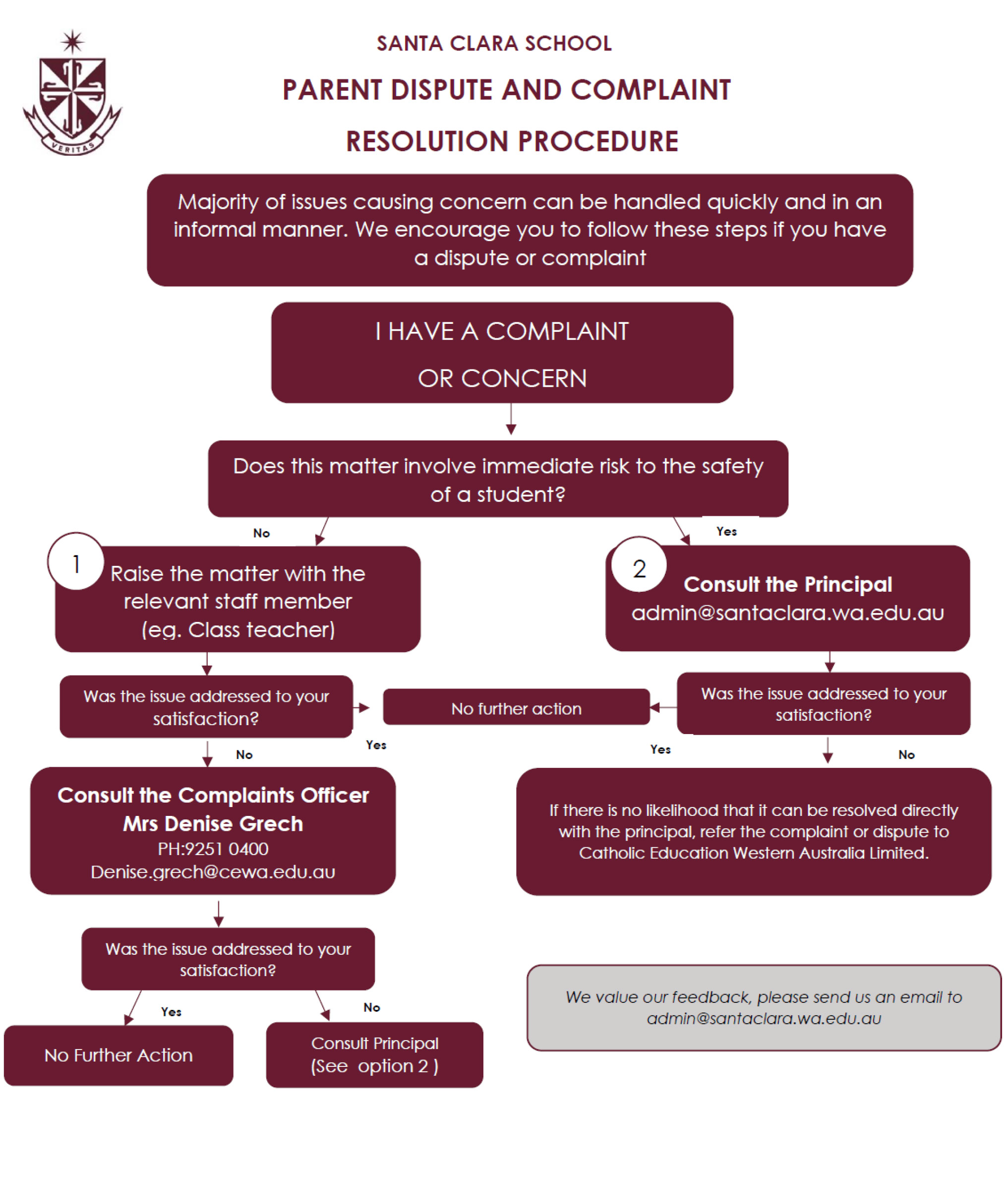Disputes And Complaints Resolution – Parents & Caregivers
Santa Clara School is committed to handling complaints effectively and efficiently. To manage complaints effectively, we have established a Complaints Management System in line with:
- Principles 6 and 9 of the National Principles for Child Safe Organisations;
- the international complaints handling standard (ISO 10002:2018 Quality Management – Customer satisfaction – Guidelines for complaints handling in organisations); and
- the Australian/New Zealand complaints handling standard (AS/NZS 10002:2014 Guidelines for complaint management in organisations).
Our school supports the rights of parents/guardians, students and staff to have their complaints taken seriously, and responded to promptly and thoroughly.
Our complaints management system allows us to effectively capture, manage and report on complaints. We commit to regular analysis of complaints received and the implementation of any actions to rectify any deficiencies identified.
We commit to making our complaints management procedures accessible and transparent. We will ensure our school community are aware of the school’s process for dealing with disputes and complaints.
Definitions
Complaint means an expression of dissatisfaction with our school services, decisions, actions or those of its staff, or about the complaint management process itself.
Dispute means a conflict regarding a right, claim, or demand on one side, met by contrary claims or allegations on the other.
The rules of procedural fairness require:
(a) a hearing appropriate to the circumstances;
(b) lack of bias;
(c) evidence to support a decision; and
(d) inquiry into matters in dispute.
Students are defined as children and young people enrolled in Santa Clara School.
Informal Complaints Resolution
The majority of issues causing concern can be handled quickly and in an informal manner. In most cases these issues can be resolved through informal discussions with appropriate staff members.
Our school welcomes suggestions and comments from parents and takes all concerns, disputes and complaints seriously. A concern will be treated as a less serious matter that may be resolved with a more informal approach.
A dispute or complaint will be treated as something that requires the formal process detailed below to be followed.
We encourage all members of our school community to first treat their issue as a concern when approaching the school, and then lodge a formal complaint if this is not handled to their satisfaction. However, in unique circumstances or where a matter involves an immediate risk to the safety of a student, the matter should be referred directly to the Principal.
Roles and Responsibilities of Staff in Resolving Complaints and Disputes
School staff and the school leadership are responsible for recording, investigating and resolving complaints and analysing them to identify causes and inform continuous improvement.
Principal
The principal is accountable for ensuring that appropriate and relevant procedures are developed, implemented and reviewed on a regular basis and relevant reporting is completed.
They are also responsible for ensuring all staff are educated about the school’s complaints management procedures and maintaining accurate records in the school’s complaints register.
Complaints Officer
The complaints officer is authorized to record, investigate and manage complaints. They are required to maintain accurate records in the complaints register and liaise with parties to a dispute or complaint.
Staff Members
All staff are authorised to deal with informal complaints. They are to record the resolution of informal matters in SEQTA. Where a person makes a formal complaint, staff must refer them to the complaints officer.
How to Make a Formal Complaint
We ask that, where appropriate, you first raise the matter directly with the relevant staff member. If that is not appropriate or the issue was not addressed to your satisfaction, or you simply wish to make a formal complaint, you can do so by contacting our Complaints Officer as per the ‘Parent Dispute and Complaint Resolution Procedure’ flowchart (See below Appendix 1).
Where there is no likelihood that a dispute or complaint can be resolved directly with the principal, the immediate parties may refer the dispute or complaint to the Executive Director of Catholic Education Western Australia Limited (CEWA Ltd).
Anonymous Complaints
It is preferable that the complaint is verifiable, however if a complaint or any other information of unknown origin (i.e. anonymous) provides information that would cause the principal concern, it should be considered by the principal so that they can determine the appropriate course of action.
The dispute or complaint shall be promptly acknowledged in writing, unless the complainant is anonymous and cannot be identified.
The parties to the dispute or complaint shall be notified of the finding(s) of the dispute or complaint, including the basis of the finding(s). There is no duty to notify an anonymous complainant.
Withdrawal of a Complaint
Anyone may withdraw a complaint or dispute at any stage of the resolution process. If a complaint is withdrawn, the matter will be deemed to be closed, unless we, at our discretion and in all the circumstances, wish to continue to address a matter raised.
Internal Formal Resolution Procedure
Step 1 – Receiving and recording the complaint
All formal complaints are logged through SEQTA by the Complaint Officer.
Step 2 – Acknowledge the complaint
All complaints will be acknowledged in writing by the Complaint Officer at the time of receipt or as soon as possible afterwards. The Complaint Officer will allocate complaints a status, priority and target resolution date.
Step 3 – Assess the complaint and address immediate risks
The Complaint Officer will conduct an investigation into the issues raised, following the principles of procedural fairness, and make a determination.
Where there is an appropriate:
- CEWA Ltd policy or directive that provides a specific mechanism for addressing the dispute or complaint; or
- binding legislative or regulator mechanism (including an Enterprise Bargaining Agreement) that addresses the issue raised in the dispute or complaint, that will be followed.
Parties may involve a support person(s) to assist them in resolving the dispute or complaint.
Step 4 – Resolving complaints
Following the determination, if appropriate, the Complaint Officer will formulate a resolution and provide a written response to the complainant. The matter will be closed if this response is accepted.
Step 5 – Further investigation
If the proposed outcome is not accepted, the matter will be reviewed internally by the principal or the principal’s delegate, who may seek additional information or submissions from the relevant parties. The principal or their delegate seek to resolve all disputes within 14 days from the date that the review process is initiated.
The principal may request external assistance and expertise (including mediation), including the involvement of the CEWA Ltd Employment and Community Relations Team to assist in the resolution of a dispute or complaint.
The matter will be closed if the response of the principal, or their delegate, is accepted.
Step 6 – Continuous improvement
All complaints received will be entered into the school’s complaints register and, where appropriate, a corrective action request will be made to address any underlying processes which the complaints investigation revealed may require improvement.
Step 7 – External resolution
If the matter remains unresolved, the parties may seek external resolution alternatives – see Reviews and Appeals.
Reviews and Appeals
Should a complainant be dissatisfied with the outcome of an informal complaint with the involvement of the immediate parties, or if there are unique circumstances, the matter can be referred to the next level by the complainant.
Once a decision has been made, parties may request a review of the decision in accordance with Procedures, including escalating the dispute or complaint to the Executive Director of CEWA Ltd. The Executive Director will investigate the complaint and/or areas of disputation in accordance with the rules of procedural fairness.
The role of the Director General
The Director General of the Department of Education is responsible for ensuring that the school observes the registration standards, including the standard about its complaints handling system. Any student, parent or community member is entitled to contact the Director General with concerns about how the school has dealt with a complaint. Information is available on the Department of Education website. While the Director General may consider whether the school has breached the registration standards, the Director General does not have power to intervene in a complaint or override the school’s decision.
Confidentiality
Confidentiality applies with respect to both information relating to the person making the complaint, and if relevant, to a person against whom a complaint is made. Our school is committed to maintaining the confidentiality of information throughout the complaints process.
Personally identifiable information about a complainant will only be made available for the purpose of addressing the complaint and (unless the complainant consents) will be actively protected from disclosure.
Children and young people have the same right to privacy, anonymity and confidentiality as adults. Children and young people may waive their right to privacy and confidentiality if they decide to involve somebody else in the complaints process, e.g. to access support.
If a complainant chooses to make a complaint without disclosing their identity, this will limit the options for proper and thorough investigation and resolution. It also raises issues in relation of procedural fairness for those who have a complaint made against them as they have the right to know of the particulars of the complaint and to respond. The school therefore cannot guarantee that anonymous complaints can or will be dealt with as effectively. Complainants are always encouraged to identify themselves.
As far as possible and appropriate, due discretion will be respected and maintained by all parties throughout the resolution process, save where persons are required to be informed on a ‘need to know’ basis or where investigative, statutory or legal requirements stipulate that matters be disclosed, reported or discussed. Therefore, there can be no overriding legal obligation or right with respect to confidentiality.
Where complaints are made in circumstances where an alleged crime may have been committed or the matter falls under the CEWA Child Protection Procedures, the WA Police and CEWA Ltd will be contacted and formally advised.
Record Keeping
The principal shall maintain appropriate records of the relevant particulars used to make a decision in response to any formal dispute or complaint. Where applicable this will include any statements made by the parties involved.
Child Friendly Complaints
The principles that apply to complaints also are applied to complaints and concerns raised by students. Our school is committed to improving the visibility, accessibility and responsiveness of the complaints process for our students.
Students are encouraged to report complaints by:
- Talking to someone in the school they feel comfortable with, whether it is a classroom teacher, a member of the support staff, a member of the leadership team, or the school chaplain.
Students can make a complaint in different ways:
- Face to face
- By telephone: (08) 9251 2400
- In writing: admin@santaclara.wa.edu.au
Complaints should be acknowledged at the time of receipt or as soon as possible afterwards. Children and young people are often wary about making a complaint and want to be assured they are being listened to straight away.
Complaints that appear trivial still need to be handled seriously. Young people may test the complaints procedures on relatively minor issues before finding the confidence to raise something painful such as bullying.
If the issue is a painful one, or if exploration of it is taking time, a student may need support from another student or from an adult. Our students are encouraged to choose a person with whom they feel comfortable to provide support.
In circumstances involving an allegation or complaint in relation to grooming, child abuse and breaches of the Code of Conduct the school will follow the CEWA Child Protection Procedures (Mandatory Reporting), and the matter is reported promptly to the responsible government authorities.






